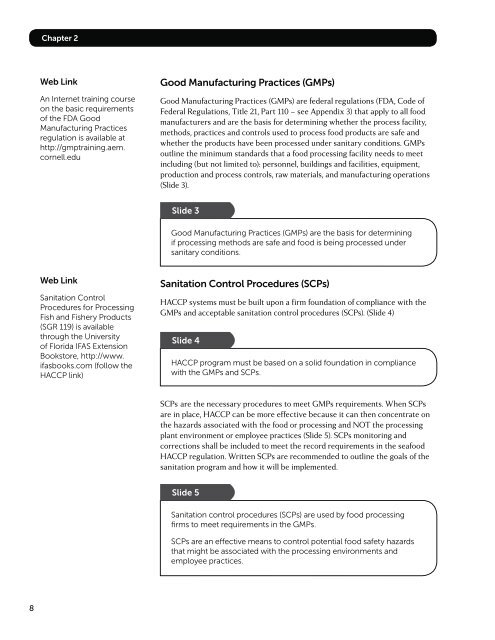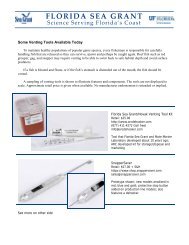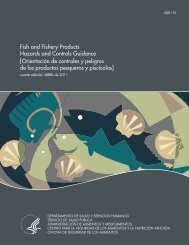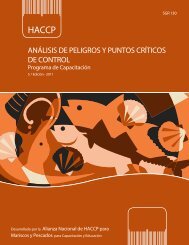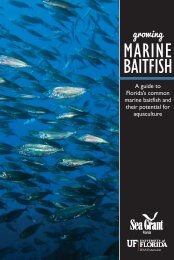HACCP
Hazard Analysis and Critical Control Point - Florida Sea Grant
Hazard Analysis and Critical Control Point - Florida Sea Grant
- No tags were found...
You also want an ePaper? Increase the reach of your titles
YUMPU automatically turns print PDFs into web optimized ePapers that Google loves.
Chapter 2<br />
Web Link<br />
An Internet training course<br />
on the basic requirements<br />
of the FDA Good<br />
Manufacturing Practices<br />
regulation is available at<br />
http://gmptraining.aem.<br />
cornell.edu<br />
Good Manufacturing Practices (GMPs)<br />
Good Manufacturing Practices (GMPs) are federal regulations (FDA, Code of<br />
Federal Regulations, Title 21, Part 110 – see Appendix 3) that apply to all food<br />
manufacturers and are the basis for determining whether the process facility,<br />
methods, practices and controls used to process food products are safe and<br />
whether the products have been processed under sanitary conditions. GMPs<br />
outline the minimum standards that a food processing facility needs to meet<br />
including (but not limited to): personnel, buildings and facilities, equipment,<br />
production and process controls, raw materials, and manufacturing operations<br />
(Slide 3).<br />
Slide 3<br />
Good Manufacturing Practices (GMPs) are the basis for determining<br />
if processing methods are safe and food is being processed under<br />
sanitary conditions.<br />
Web Link<br />
Sanitation Control<br />
Procedures for Processing<br />
Fish and Fishery Products<br />
(SGR 119) is available<br />
through the University<br />
of Florida IFAS Extension<br />
Bookstore, http://www.<br />
ifasbooks.com (follow the<br />
<strong>HACCP</strong> link)<br />
Sanitation Control Procedures (SCPs)<br />
<strong>HACCP</strong> systems must be built upon a firm foundation of compliance with the<br />
GMPs and acceptable sanitation control procedures (SCPs). (Slide 4)<br />
Slide 4<br />
<strong>HACCP</strong> program must be based on a solid foundation in compliance<br />
with the GMPs and SCPs.<br />
SCPs are the necessary procedures to meet GMPs requirements. When SCPs<br />
are in place, <strong>HACCP</strong> can be more effective because it can then concentrate on<br />
the hazards associated with the food or processing and NOT the processing<br />
plant environment or employee practices (Slide 5). SCPs monitoring and<br />
corrections shall be included to meet the record requirements in the seafood<br />
<strong>HACCP</strong> regulation. Written SCPs are recommended to outline the goals of the<br />
sanitation program and how it will be implemented.<br />
Slide 5<br />
Sanitation control procedures (SCPs) are used by food processing<br />
firms to meet requirements in the GMPs.<br />
SCPs are an effective means to control potential food safety hazards<br />
that might be associated with the processing environments and<br />
employee practices.<br />
8


